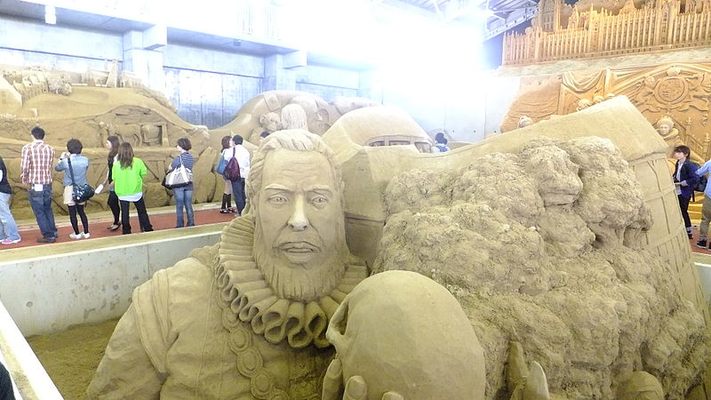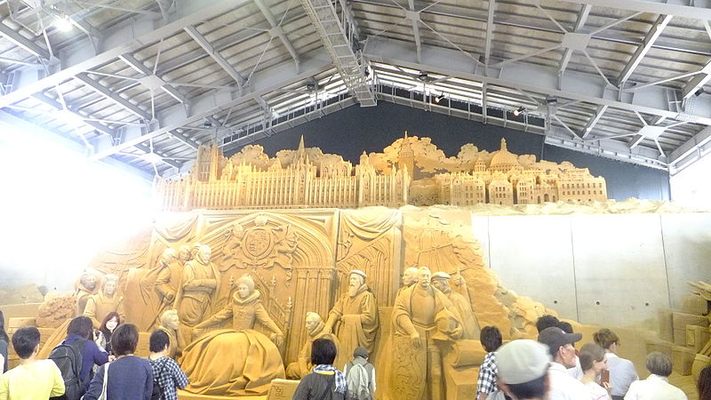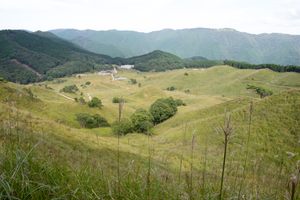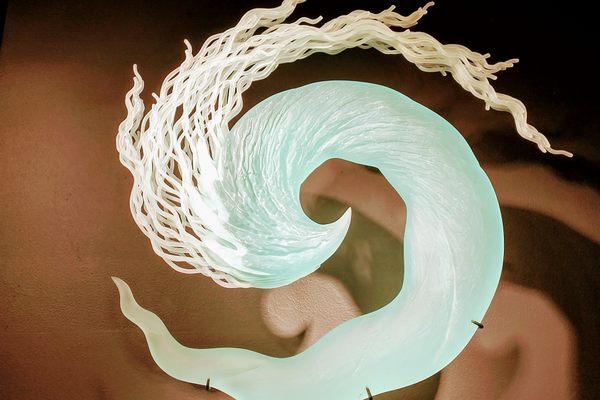About
There are not many places in the world where giant sand sculptures last for three quarters of the year, and then only come down deliberately. The Sand Museum in Tottori, Japan, was the first.
Sculpted from 3,000 tons of sand, the incredibly unique exhibits at the Sand Museum are prepared yearly for a mid-April opening and destroyed in early January of the following year to make way for the next exhibit. The impermanence of each exhibit is part of the draw.
Tottori was already famous for its 10 miles of massive sand dunes along the coast of the Sea of Japan. The museum was an attempt by the city to capitalize on its main tourist attraction.
In 2006, the town put the sand sculpture exhibition project into the hands of a noted Japanese sand sculptor, Katsuhiko Chaen. The first exhibit, based on the work of artists like Leonardo da Vinci and Michelangelo, opened that November, under a tent, and lasted a little more than a month. In 2012, the yearly exhibit got a permanent home, including a 21,000-square-foot exhibition floor to accommodate the giant sculptures and allow the movement of bulldozers when it came time to bring them down.
Each piece is a combination of Chaen’s vision, the artist’s style, and the limitations of working with sand. The sand is wetted before the sculpting, but other than water nothing is used to make it stick together. Sculptors have to watch weight distribution and prominence of features; anything that sticks out too far may fall off easily. Because of this, the sandy depictions of people and buildings are often flatter than life.
Despite its proximity to the miles of sand dunes, the museum's founders could not use sand from the dunes for the sculptures since the dunes had recently been designated a national park. They brought in sand leftover from a road building project years before to use instead. Undeterred, artists from all over the world create works based around the theme of the year, which is usually a country or region of the world, sometimes coinciding with whoever is hosting the Olympics. For two weeks, the sculptors use everything from shovels to chisels to bring the piles of sand to life.
Around the museum, there are plenty of patches of sand for those inspired by the unique exhibits to start practicing in.
Related Tags
Community Contributors
Added By
Published
April 14, 2017
Sources
- https://www.nytimes.com/2017/04/10/world/asia/japans-sand-museum-a-home-to-ephemeral-treasures.html?mabReward=A3&recp=2&moduleDetail=recommendations-2&action=click&contentCollection=N.Y.%20%2F%20Region®ion=Footer&module=WhatsNext&version=WhatsNext&contentID=WhatsNext&src=recg&pgtype=article&_r=1
- http://www.japan-guide.com/blog/sean/130520.html
- http://www.japan-guide.com/e/e8102.html
- http://www.sand-museum.jp/en/?page_id=68
- https://en.wikipedia.org/wiki/Sand_Museum
- http://www.latimes.com/travel/la-trw-sand-pg-photogallery.html
- http://www.tokyoweekender.com/2012/10/tottori-sand-museum/
- http://www.sandsational.com/blog/the-tottori-sand-museum-japan




























